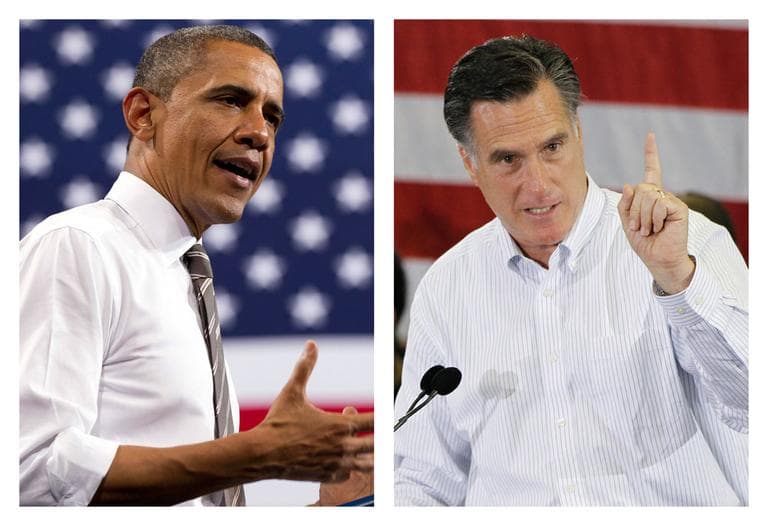Advertisement
COMMENTARY
Predicting The Unpredictable – Who Will Win The White House?

There is no crystal ball to reveal whether it’s Mitt Romney or Barack Obama who will take the presidential oath of office on January 20, 2013.
Some people will predict the winner based on recent polls in swing states, economic indicators, or “all my friends say...” But it’s unknowable. There are too many variables.
Six days before the election, polls in swing states might make it easy to tell who will win. Perhaps six weeks before, trends will be clear (for example, after the economy imploded in September of 2008 and John McCain seemed confused about what to do, President Obama became the clear front-runner). But can we predict with six months to go? Well, we can try...
Here’s a do-it-yourself scorecard for determining who will win. While it is not scientific, it’s a way to review many of the X factors that will affect the outcome.
Estimate how the candidates will do in each category (for example, debate performance), add all ten categories, and then divide by 10 to get your prediction. I’ll offer guesses but, like an economic forecaster, I reserve the right to revise my figures as we get new data.
Debate: Romney 45%, Obama 55%
Neither candidate is an exceptional debater. Obama was an effective orator in 2008, but didn’t really “win” debates with Hillary Clinton and John Edwards. He did pretty well against McCain, but not memorably. Romney was not very impressive in GOP debates — as the front-runner he “won” by not stumbling.
In the coming debates Obama will be more personable and agile. Romney can seem stiff and overly scripted. But the reason I don’t give Obama a bigger lead is because A) Romney will have low expectations to beat, and B) Obama must defend his record.
Money: R-48%, O-52%
The early conventional wisdom was that Obama would raise a billion dollars and greatly outspend his Republican opponent. But campaign disclosure reports reveal that Obama fundraising has lagged – he’ll raise far less than expected – and Romney/RNC fundraising is going well.
With conservative PACs raising a lot of money and perhaps Romney later deciding to contribute a large sum personally, the money contest could be close. I give the edge to Obama because an incumbent has more leverage in enticing prospective donors, and much of his travel and PR is paid by the taxpayers.
Consumer Confidence: R-59%, O-41%
Gas prices will probably remain high, housing will still be relatively stagnant and most voters will continue to tell pollsters that the country is going in the wrong direction. (Currently the RCP average of polls has it at 33% “right direction” and 59% “wrong track.”) It’s hard to imagine that voter attitudes will greatly improve by November.
Business News: R-58%, O-42%
Economic indicators like the unemployment rate, job growth, GDP, stock market, etc. could have a big impact in the final months. Given what’s happening in Europe, and the continued gridlock in Washington, the economic news probably won’t inspire many voters to sing “Happy Days Are Here Again.”
Economic Plans: R-56%, O-44%
Each candidate will try to sell the idea that he has the best strategy to boost the economy. Since Obama has a difficult record to defend (e.g. most think the “stimulus” plan failed), and Romney is seen as more business savvy (according to polls), Romney is the favorite. The reason I don’t give Romney a bigger lead in this category is because the Obama campaign will continue to attack his record at Bain Capital and as Massachusetts governor (reiterating the charge that our state was 47th in job creation), and appeal to voters who blame Wall Street for the recession.
Gaffes & Scandals: R-50%, O-50%
Romney is more gaffe-prone than the word-conscious president. But as president, Obama is more likely to have new scandals to explain since he’s responsible for numerous appointees in his administration. Some administration scandals will probably be debated and advertised — the Solyndra bankruptcy, “Fast and Furious” gun smuggling, Secret Service and GSA partying.
Field & Surrogates: R-48%, O-52%
The Obama camp has invested much more time and money in building and maintaining field organization and social media networks. They also have strong organizational allies in labor unions and liberal activist groups.
On the GOP side, Republican, conservative and business groups have robust field operations and social media networks as well. But the Obama campaign, having started years ago, is better organized for get-out-the-vote efforts. Surrogates are less gung-ho about their candidates than in past presidential races – including celebs – but their passion will rise in the final weeks when they focus on the opposition and worry about the stakes.
Advertising: R-50%, O-50%
It is too early to judge which campaign will produce the more persuasive broadcast spots. Each party has plenty of creative talent to draw on, although it can become a problem if too many chefs are fighting in the kitchen. My guess is that the Romney campaign will come up with more effective negative ads than positive ads, and conversely, the Obama campaign will come up with more effective positive ads. However, when we compare ads in this campaign we will also be evaluating ads created by PACs and freelance activists. The ads by renegades will likely be the most popular.
Media Coverage: R: 39%, O-61%
Conservatives believe that liberals dominate the media, and liberals fear it is not true anymore. In an April 2008 Boston Globe op-ed, I developed a scorecard to rate “media bias” in the expected Obama vs. McCain contest — and concluded that Obama would be favored 59% to 41%. But it wasn’t just ideological bias. I listed many factors that produce media bias – bias for excitement, for visuals, access, humor, conflict — and Obama benefits from media bias in this race.
I don’t suggest an even larger lead for Obama in getting favorable media coverage because A) many in the media have had some disillusionment over Obama not being as transformational as they had hoped and B) the so-called establishment media have less influence due to the continued growth of conservative media and social media.
Catalytic Event: R: 47%, O-53%
Sometimes there’s an “October surprise” that will sway voters. In 2008, it was a September surprise with the crash of financial markets. If there is a catalytic event in the final weeks, it could be a foreign policy crisis or cultural controversy. Such an event would likely benefit Obama if he showed decisive leadership and it diverted attention from the economy. However, if Obama didn’t handle it well, undecided voters could conclude that he failed the test and it was time for a new leader.
Adding all guesstimates and dividing by ten, the result is: Romney-50%, Obama-50%.
Of course I wouldn’t predict a winner. Didn’t I say it was unknowable this early?
Democrats hope for an election like 1996, when the Democratic incumbent, President Bill Clinton, handily beat Bob Dole, 49 percent to 40 percent — taking 70 percent of the electoral vote. Republicans hope for a result like 1980, when GOP challenger Ronald Reagan beat President Jimmy Carter, 51 percent to 41 percent — taking 90.9 percent of the electoral vote.
But, at this point, the race seems more like the elections of 2000 and 2004, when it was so close that a single swing state (Florida in 2000, Ohio in 2004) was the key to victory.
There’s one thing that’s predictable: Massachusetts will not be the pivotal state.
This program aired on May 18, 2012. The audio for this program is not available.
